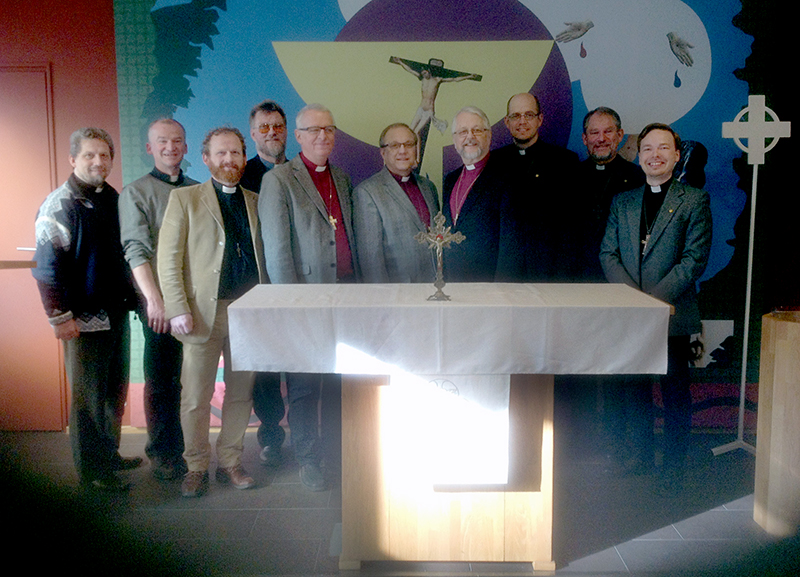
Representatives to the Church Fellowship talks in Finland.
FINLAND – Representatives of the Communion of Nordic Lutheran Dioceses began church fellowship talks with the Independent Evangelical Lutheran Church (SELK) of Germany and the Evangelical Lutheran Church in England (ELCE) during meetings April 13-14, 2016 in Helsinki, Finland. The Nordic Lutheran Dioceses officially formed in 2015, and is composed of the Evangelical Lutheran Mission Diocese of Finland, the Mission Province of Sweden, and the Evangelical Lutheran Diocese of Norway.
These three churches have attempted to operate within the confines of their respective national church bodies, but have increasingly come into conflict with them as the national churches have become increasingly liberal. The bishops and almost all clergy associated with the Dioceses have been defrocked by their national church bodies for their confessional stance.
Planning for these talks has taken three years and was first only envisioned to include the ELCE and the Evangelical Lutheran Mission Diocese of Finland. But as discussions progressed, it was considered prudent to include the other two Nordic Dioceses as well as the SELK so that the scope and breadth of these talks could be increased.
The discussions were held at the Finnish Diocese’s Koinonia Centre in Helsinki.
Meetings began with worship and discussion soon followed on the nature and identity of the Church. Each church body presented their constitution and spoke about how the Lutheran Confessions shape their self-understanding and ecclesiastical identities. Despite the influence of national and historic influences on the wording and structures of their constitutions, it was agreed that a clear and common understanding, founded upon the Lutheran Confessions, existed between the Nordic Missions Dioceses, the SELK, and the ELCE. The definition of “free” and “independent” churches were discussed and clarified, and the Nordic Dioceses made it clear that they were independent of all national church structures, governance, and practices.
The two day conference discussed twelve other topics as well, including the doctrine of Holy Scripture, the Holy Trinity, the person and work of the Son of God, the person and work of the holy Spirit, justification and sanctification, the end times, and ecumenical relations with other churches, both inside and outside Lutheranism. It was agreed these discussions were very helpful and that there was substantial agreement on these doctrines among all five churches.
The area that garnered most discussion was on the subject of the church and church structure. The Nordic Mission Dioceses and the SELK are episcopal, meaning they have bishops and a more centralised church structure. The ELCE, meanwhile, is more congregational and does not have a bishop. Dialogue here led to further discussions on the Office of the Holy Ministry. All participants agreed that while the particular form and structure of a church is important, what is ultimately important is how that structure assists the church to proclaim the Gospel and administer the sacraments as she carries out Christ’s mission in the world.
The participants have agreed upon a joint statement summarising the discussions, which will be taken back to their churches for consideration and consultation.
The Evangelical Lutheran Church in England and the Independent Evangelical Lutheran Church in Germany are both member churches of the International Lutheran Council (ILC), a global association of confessional Lutheran church bodies. The churches of the Communion of Nordic Lutheran Dioceses recently began official discussions about becoming members of the ILC.
—————————————————–
